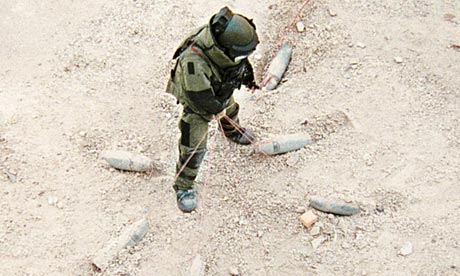 In a directed film they portray the emotion of sadness or sorrow because they are actors with scripts being directed to be that way, but it is very different when we can see what a real band of brothers are. We were able to watch The Hurt Locker, which gave us an insight on a thrill seeking soldier who did not follow protocol, putting his team in danger during missions. When I was watching The Hurt Locker, I did not feel the emotion or the sorrow that the actors are supposed to give off because I knew they were acting. In one scene of the movie, a soldier was crying over a young boy who he had befriended that was turned into a human bomb. I felt sorrow during the scene but the emotion did not last long due to the fact that I knew it was acting. In Restrepo, during a mission the soldiers endured the loss of one of their brothers, and during that time our class felt the emotion and sadness the soldiers were giving off because we knew it was not acting.
In a directed film they portray the emotion of sadness or sorrow because they are actors with scripts being directed to be that way, but it is very different when we can see what a real band of brothers are. We were able to watch The Hurt Locker, which gave us an insight on a thrill seeking soldier who did not follow protocol, putting his team in danger during missions. When I was watching The Hurt Locker, I did not feel the emotion or the sorrow that the actors are supposed to give off because I knew they were acting. In one scene of the movie, a soldier was crying over a young boy who he had befriended that was turned into a human bomb. I felt sorrow during the scene but the emotion did not last long due to the fact that I knew it was acting. In Restrepo, during a mission the soldiers endured the loss of one of their brothers, and during that time our class felt the emotion and sadness the soldiers were giving off because we knew it was not acting. During Restrepo, we are also able to see what soldiers do on their off time when they are not on missions, building outposts, or protecting themselves from the Taliban. I used to think that soldiers never had down time, that they were in war all day and night. Directed films portray that but it does not compare to a real life bonding moment between one soldier and another when they are just hanging out, talking, and reminiscing. In one scene of Restrepo, the soldiers are joking around and remembering the brother that they lost during their time in the Korengal Valley. They had true genuine emotions and bonds with one another and we are able to see that. In The Hurt Locker, the thrill seeking soldier was an outcast, but as time went on the soldier was able to bond with the other soldiers because he showed a softer side to his demeanor. However, it is all acting and we know that so it does not move us in any way.
During Restrepo, we are also able to see what soldiers do on their off time when they are not on missions, building outposts, or protecting themselves from the Taliban. I used to think that soldiers never had down time, that they were in war all day and night. Directed films portray that but it does not compare to a real life bonding moment between one soldier and another when they are just hanging out, talking, and reminiscing. In one scene of Restrepo, the soldiers are joking around and remembering the brother that they lost during their time in the Korengal Valley. They had true genuine emotions and bonds with one another and we are able to see that. In The Hurt Locker, the thrill seeking soldier was an outcast, but as time went on the soldier was able to bond with the other soldiers because he showed a softer side to his demeanor. However, it is all acting and we know that so it does not move us in any way.
I am not bashing directed films on war because they are still entertaining and meaningful. I would just prefer a documentary on war than a directed film on war, due to the realness of it all. Directed films gives us an outlook of what war is like, but when we are able to see war for what it really is, it changes your whole mind set.
Would you prefer a directed film or a documentary on war or any other life changing event that has happened in life?





